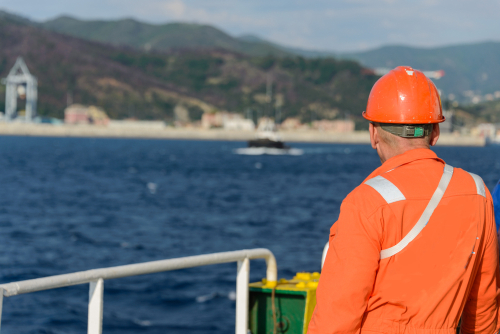The international community took a significant step forward on 1 December 2020, when it adopted UN General Assembly resolution A/75/17 to urge its Members to designate seafarers as key workers. As of 20 May 2021, 60 IMO Member States and two Associate Members have made this designation and have subsequently developed and implemented policies designed to safeguard and promote seafarer welfare and mobility. However, it is vital that nations act collectively to ensure this momentum is not lost, urge Dr Heike Deggim & Mr. Paul Levey from IMO.
While much of the mainstream media continues to focus on problems associated with shipping capacity management, including the dearth of containers and unprecedented delays at ports, trade journals, IMO and maritime non-governmental organizations (NGOs) also recognise the difficulties the COVID-19 pandemic has wrought on crew change and seafarer repatriation. As a result, IMO continues to advocate, through a variety of fora and media, the importance of seafarers as the human component of maritime trade.
Whilst it is encouraging that the scale of the seafarer humanitarian crisis witnessed during 2020 has diminished to some extent, we must not rest on our laurels. Over 200,000 seafarers are still working beyond the expiration dates of their contracts and perhaps the same number again are ‘stranded at home’ and experiencing severe financial hardship, as they are unable to join ships due to travel and/or vaccination-status constraints.
Despite this sobering statistic, it is heartening to note that an ever-increasing number of Member States are permitting crew change and seafarer repatriation. In addition, flag, port and seafarer providing States continue to engage with each other, and ship management companies, to resolve issues ranging from the non-payment of wages to medical evacuation from ships in the event of serious illness and/or injury.
The decision to further assist seafarers and enhance the efficiency of maritime trade by implementing seafarer vaccination programmes is also welcome. According to information published by the International Christian Maritime Association, over the last three weeks the number of countries that have implemented such programmes, or have signalled their intent to do so, in specified ports within their jurisdictions has increased from 24 to 27. While we are extremely grateful to them, we continue to work collaboratively with Member States and NGOs in consultative status with IMO to encourage others to step forward to accelerate the vaccination of seafarers serving international shipping.
IMO recognises Member States are confronted with myriad complex – and often competing – social and economic challenges, and that they have the inherent right to prioritise the rollout of scarce vaccine resources in accordance with their own national risk assessments. However, given that the preponderance of trade is moved by sea, we believe that it is imperative for Member States, wherever possible, to apply the principles laid down in the WHO SAGE Roadmap for Prioritizing uses of COVID-19 Vaccines in the Context of Limited Supplies, as updated on 16 July 2021. The crucial role played by other marine personnel, for example those working onshore to load and unload cargo, should also not be forgotten as they serve as an intrinsic part of the maritime supply chain.
The type of vaccine administered is also important and the general consensus within the shipping industry is that States should offer WHO-approved Emergency Use Listing (EUL) vaccines to ensure seafarer vaccination status can be recognized internationally. As well as reducing the chances of seafarers contracting COVID-19 and falling seriously ill on-board ship, administering such vaccines should also promote seafarer mobility by allowing them to move efficiently between their place of work and home, and between employment contracts.
It quickly became apparent to Governments that today’s interwoven supply networks and ‘just in time’ economic models had left the global economy uniquely vulnerable to any significant disruption of maritime trade. Pragmatic decisions have thus far underpinned the continuance of international trading patterns, but it is also vital for all parties to consider the human element. IMO therefore urges Member States to recognise the personal sacrifices that continue to be made by professional seafarers and to act empathetically, in order to reduce the additional burdens operating under pandemic conditions has undoubtedly placed upon them.
We would like to echo the sentiments expressed by the IMO Secretary-General and ILO Director-General in a recently issued joint statement and urge all maritime stakeholders to redouble their efforts to uphold the basic rights and dignity of seafarers, so that they may continue to facilitate the global economy.
The views presented hereabove are only those of the author and do not necessarily those of SAFETY4SEA and are for information sharing and discussion purposes only.

































































